Sherlock brought out the second episode of its sixth season, “The Lying Detective”, on Sunday. While the previous one was bad, this was actually a good piece of television. It makes its many issues all the more jarring.
Recap
John has a new therapist, and while in session, he neglects to tell her he has hallucinations of his dead wife. He does discuss how he’s sure he wouldn’t have missed Sherlock trying to contact him if he had done so. Just at that moment, a flashy sports car appears in front of the door, pursued by the police.
We cut to a meeting room where Mr. Smith, a millionaire and philanthropist (no word on genius, but probably a playboy too), tells his most trusted friends and his daughter Faith that he needs to make a confession to them, but that he’ll drug them so that they forget it. The confession is that he needs to kill someone.
His daughter seems to remember at least bits of that meeting. The next we see is her visiting Sherlock, telling him all about it. Her whole life, she says, was changed by one word when her father told them whom he needed to kill.
Sherlock sends her away at first, but then he deduces she’s about to kill herself and he stops her and takes a walk with her, accepting her case. During the entire progress of their walk, Mycroft is monitoring them from a helicopter
We cut back to John at the therapist’s, where Mrs. Hudson gets out of the flashy car and emotionally blackmails him into promising to help Sherlock. Then she opens the trunk to reveal the detective there. He is high as a kite once again, but tells John that Mr. Smith is a serial killer. He has made the same announcement on his blog, too. About the same time, Mr. Smith calls to ask John and Sherlock for lunch.
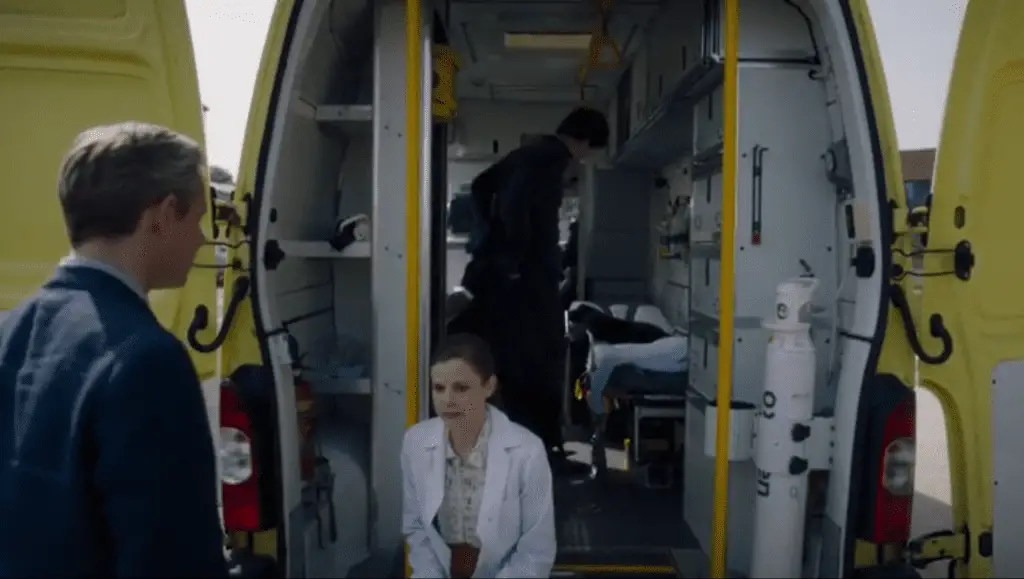 John agrees to go on the condition that Sherlock will be examined by Molly Hooper and that it’ll be confirmed he’s really on drugs again and so does actually need his help. Molly confirms that he’s “using again” and that at the rate he’s going, he has got weeks to live. Sherlock is unperturbed, and off to lunch they go.
John agrees to go on the condition that Sherlock will be examined by Molly Hooper and that it’ll be confirmed he’s really on drugs again and so does actually need his help. Molly confirms that he’s “using again” and that at the rate he’s going, he has got weeks to live. Sherlock is unperturbed, and off to lunch they go.
It turns out that Mr. Smith has turned Sherlock’s announcement into a publicity stunt, and he is now promoting his cereals with saying he’s a “cereal killer”. They go to the hospital Mr. Smith is financing. There is a lot of creepy dialogue. Sherlock pickpockets Mr. Smith’s phone to send a text to his daughter, and later he announces she would meet them and that he told her Mr. Smith confessed. When the woman arrives, however, it turns out it’s not the same one who visited Sherlock, which throws him a little, to the point that he starts hallucinating, is hysterical and attempts to stab Mr. Smith with a scalpel, only to be restrained and beaten by John.
Next he’s to be found lying in a hospital bed when Mr. Smith comes in. Sherlock asks the madman to kill him by increasing the dosage of whatever drug he’s on. In “about an hour”, he should be dead. Mr. Smith uses the remaining time to confess.
Meanwhile in Sherlock’s flat, Mycroft is trying to figure out what drove Sherlock over the edge when John comes. They discover the Miss me? CD Mary left Sherlock. Playing the message, John sees that Mary told Sherlock to put himself in danger because if he does, John would come to rescue him, while he would never accept help.
Seeing this, John rushes tot he hospital in Mrs. Hudson’s car, where he saves Sherlock just in time, as Mr. Smith ran out of patience and was suffocating the detective.
It turns out his confession was recorded, so that’s one case solved, and in fact, Mr. Smith just goes on confessing once he’s at the police station. It’s a hobby of his, apparently.
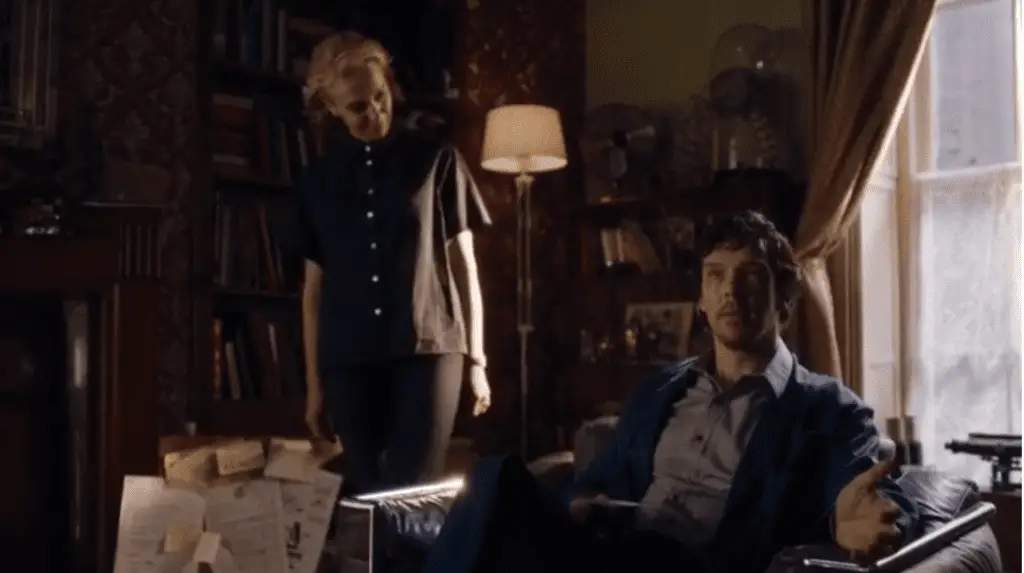 John and Sherlock sit together and make up, in a way. John tells Sherlock he no longer blames him for Mary’s death. He also discovers that Irene Adler is still texting Sherlock and starts to bully him into answering her texts because everybody needs a romantic relationship. They apparently make you a better person, like Mary did to him. Sherlock begins to tell him that he’s plenty good enough even alone, and John confesses – mostly to the Mary inside his head – that he cheated on her. In the next second, however, he says it was only ever text messages, which Sherlock assures him that is not a big deal and that he asks too much of himself. He admits that, yes, even he sometimes replies to Irene’s messages.
John and Sherlock sit together and make up, in a way. John tells Sherlock he no longer blames him for Mary’s death. He also discovers that Irene Adler is still texting Sherlock and starts to bully him into answering her texts because everybody needs a romantic relationship. They apparently make you a better person, like Mary did to him. Sherlock begins to tell him that he’s plenty good enough even alone, and John confesses – mostly to the Mary inside his head – that he cheated on her. In the next second, however, he says it was only ever text messages, which Sherlock assures him that is not a big deal and that he asks too much of himself. He admits that, yes, even he sometimes replies to Irene’s messages.
They hug.
We get a scene of Lady Smallwood effectively asking Mycroft out on a date.
Alone for a moment, Sherlock finds the paper Mr. Smith’s “daughter” left at his flat and realizes he didn’t hallucinate her. He shines ultraviolet light at the paper and it reveals the message “Miss Me?”
And to close with, there is a scene with John at his therapist again, only it turns out that the therapist is actually the same woman he’s been “cheating” on Mary with and who visited Sherlock as Faith. She is Sherlock’s and Mycroft’s secret sister, The East Wind, who then fires a bullet at John.
No, I’m not making this up.
Review
So, this is still not a detective story. We know who the killer was from the start, and there wasn’t even any mystery of how he did it, because there are no particular cases. But whatever this is, it’s more Sherlock than the previous episode was, so that’s a good thing.
It worked, too, emotionally and as far as characters go. The grief was handled relatively well from my point of view, managing to convey some improvement without pretending that everything would be fine again in a few weeks. John saying “it’s shit, but it is what it is” sums up their approach pretty well, and it was believable both in and out of universe.
The reconciliation between John and Sherlock was equally well done. As a touch-averse person, I’m not usually a fan of people who don’t hug suddenly hugging and that being used to express deeply felt emotion. These scenes make me uncomfortable. But here, somehow, it worked. John and Sherlock are close enough friends and it’s an emotionally enough fraught situation that even I felt the hug was needed. It hit every note it should have.
In relation to this, let me call out one great line:
By saving my life, she conferred a value on it. It is a currency I do not know how to spend.
– Sherlock, about Mary
Thematically, though, we’re starting to go in circles a little. This is the third season where Sherlock sacrifices himself for his friends in some way. Even the way he does it, in fact, are similar. The reason why the sacrifice was necessary was a little different this time at least, but still, we’re going over a ground we have already covered, and I fear that once again, it will not end up costing Sherlock anything, making the whole theme of sacrifice rather moot.
Related to this is the depiction of drug abuse. It’s a good thing they show its dangers, I suppose, but on the other hand, what is this supposed to mean about long-term effects? Withdrawal? Is Sherlock going to be perfectly fine the moment he stops actively using drugs? I fear he will, which is why I say the supposed sacrifice will end up costing him nothing. Let’s hope they will surprise me.
While “The Six Thatchers” were a series of false notes in characterization, this didn’t really have many issues in that department. Perhaps the biggest one would be Mycroft. Once again, he oscillates between omnipotent and impotent. He follows Sherlock with a helicopter when he goes for a walk, but he lets him lie in the hospital of the man Sherlock has just accused of being a serial killer and then tried to kill. And when John calls him to tell him there’s danger, he’s all “no, he’s fine”. I know the story needed John to save him, but then invent a way that works better.
One of the good ways “The Lying Detective” channels fanfiction, as I claim in the title, is what they do with Mrs. Hudson. The way they take her background, which was just casually mentioned until now, and bring it a bit to the foreground. Mrs. Hudson drives a flashy car at top speed while being on the phone and, as she tells John, “I own property in central London.” What did you think, silly? “I’m not your housekeeper”, I’m the widow of a drug lord.
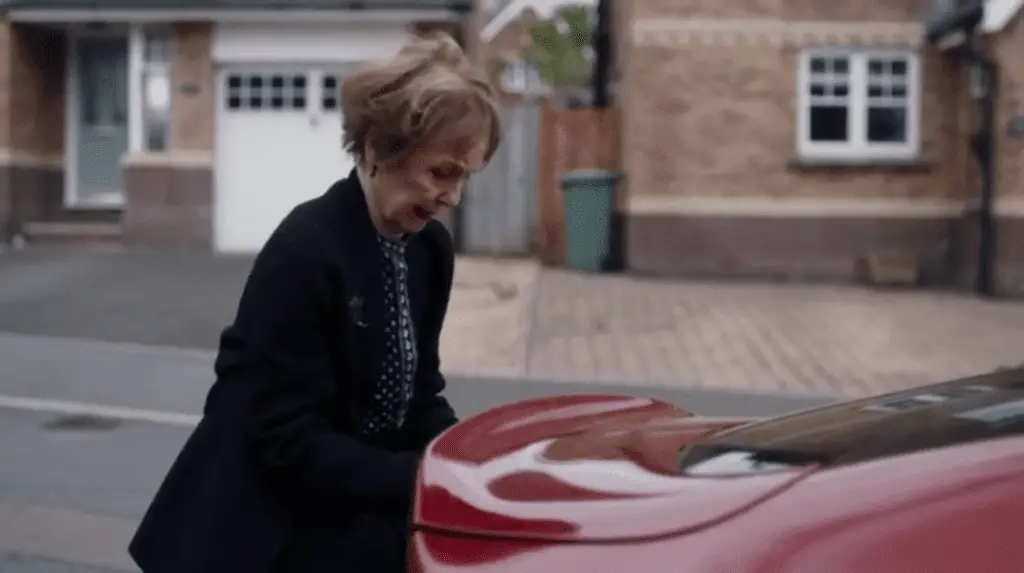 It was fantastic seeing a bit of the lady who got her husband executed and then inherited the money. Though I have to say, if she did not know about Sherlock’s plan to help John and really in all honesty emotionally manipulated a man whose wife was recently deceased to help Sherlock, well, that’s cold even for a drug boss.
It was fantastic seeing a bit of the lady who got her husband executed and then inherited the money. Though I have to say, if she did not know about Sherlock’s plan to help John and really in all honesty emotionally manipulated a man whose wife was recently deceased to help Sherlock, well, that’s cold even for a drug boss.
And speaking of her being cold, Mrs. Hudson called Mycroft a reptile – does she know what he did to his sister, whatever it was? Because apart from possibly that, I can’t recall anything that would deserve such vitriol. Especially as she was speaking to him so fondly in season three. Sure, that guy misuses government resources, but as she so kindly pointed out, she’s the widow of a drug lord who lives off his money after she got him executed. She’s hardly one to judge, but her behaviour towards him seems to be determined entirely at random. Especially as Mycroft, however emotionally constipated he might be, is worried about his brother at the moment. So could she lay off with the invectives?
But enough about Mrs. Hudson. As for the other female characters, Mary remains as awesome in death as she was alive, but Molly was much less satisfying. She is there in her usual role, only to help and worry. Give us back the Molly who slapped Sherlock for abusing drugs!
The last female character worth a mention (though the nurse was great!) is the therapist, AKA Eurus. First, and related to her, it’s worth a moment to comment on the revelation that John’s “cheating” was only texts. It’s lovely they didn’t have John act completely out of character. That’s oen problem of the previous episode gone. On the other hand, that puts us back to where he is actually perfect. Why can’t we just stick with a middle ground and have him have realistic faults?
And then, well. What is it with this show and heteronormativity? Sherlock was coded as aromantic asexual for the entirety of the first season, then his fascination with Irene Adler was clearly meant to be something out of his experience. Even the “relationship” he had in season three was just to get to Magnussen. But now we have John telling him that the only way to be a good person, to be happy, is in a romantic relationship? For real?
If that argument was “if that is what you want, you shouldn’t let some stupid pose prevent yourself”, then fine. But romantic relationships are not a magical spell to make people better! In fact, I know a few couples who make each other’s faults worse, and while I suppose it can prevent you from becoming too selfish, so can friendship or adopting a child or any number of things. Seriously.
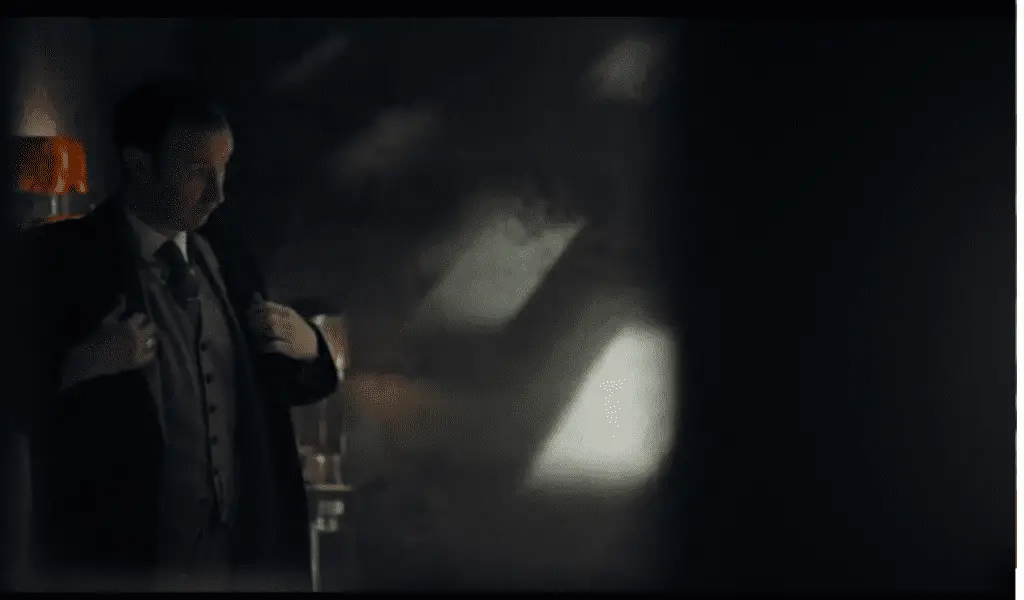 And Mycroft, who was definitely coded as aromantic (and also perhaps gay, or at least about two lines in the show seemed to hint that way), is seen being asked out by Lady Smallwood, because God forbid two people of the opposite sex just work together as colleagues, right?
And Mycroft, who was definitely coded as aromantic (and also perhaps gay, or at least about two lines in the show seemed to hint that way), is seen being asked out by Lady Smallwood, because God forbid two people of the opposite sex just work together as colleagues, right?
But I will take it all back if it turns out their secret sister is a trans woman.
It would fit perfectly. Mycroft, as much as I love him, looks like exactly the sort of person who would refuse to accept his sister’s gender and insist on calling her by her dead name – thus Sherrinford. (And yes, Euros is masculine too, but bear with me.)
It’s the only way to save the twist with the sister, which looks very much like a desire to cheaply shock and only made me think of bad fanfictions with self-insert original characters in the form of a Holmes sister who is even smarter than both brothers combined and, of course, extremely pretty, and her name is Mary Sue.
Her jab at John about automatically assuming she was a brother makes no sense as it stands, too, because Mycroft literally said “it makes no difference Sherlock is my brother, it didn’t matter the last time.” See? An explicit mention of brother. The original logic behind Sherrinford Holmes – the first deduced existence of a third sibling – needed a brother too, since it was the supposition that in a gentry family, the eldest brother would inherit the country property and take care of it, and since Mycroft obviously wasn’t doing that, there had to be another one. Whatever way you look at it, trans Eurus is the only one that makes sense. Now give her to me!
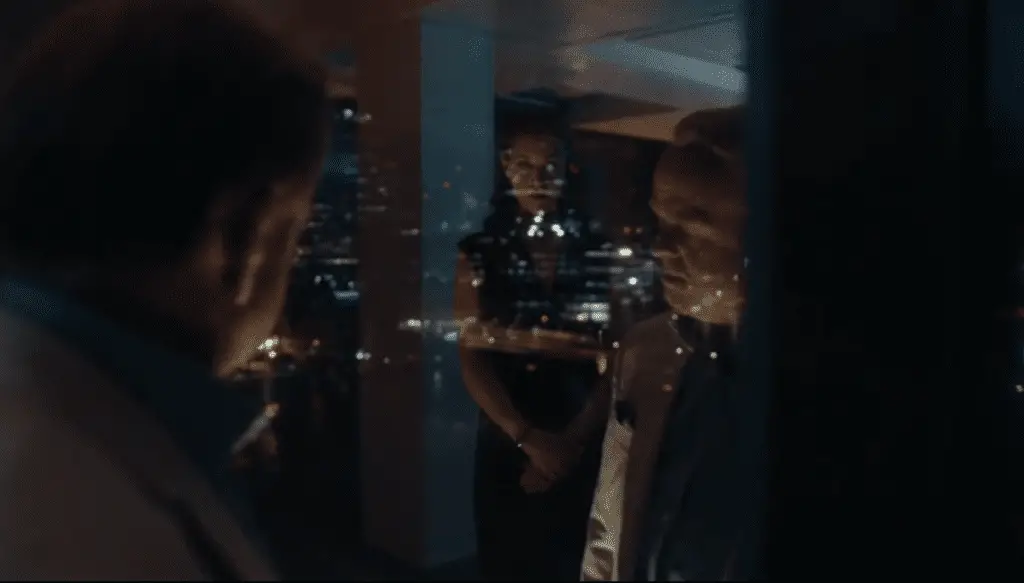 There is one more plot issue I can’t help to mention. Sherlock deduces Mr. Smith is a serial killer by Faith’s statement that it was one word, reasoning that names are always two words, so the word must have been “anyone”. In actual reality, it could have been a lot of other words. Sherlock himself offers a case, Napoleon, and “Faith” offers another, “Elvis.” There are countless other examples, and then it could have been a name of someone so familiar to her the first name would have worked. Or, it could have been a pronoun, like “you.”
There is one more plot issue I can’t help to mention. Sherlock deduces Mr. Smith is a serial killer by Faith’s statement that it was one word, reasoning that names are always two words, so the word must have been “anyone”. In actual reality, it could have been a lot of other words. Sherlock himself offers a case, Napoleon, and “Faith” offers another, “Elvis.” There are countless other examples, and then it could have been a name of someone so familiar to her the first name would have worked. Or, it could have been a pronoun, like “you.”
All of these are really obvious, and there is no way Sherlock wouldn’t have thought of them. They just wanted him to make the deduction (and twist the expectation that it would be one particular person) and didn’t quite know how. I know this sounds like a nitpick, but it broke my immersion quite substantially while watching.
Speaking of subverting expectation, most of this episode was predictable (or stupidly twisting in one case), there was one point that caught me unawares. When Mrs. Hudson came in to ask John to help Sherlock, I actually had a moment of fury to think that John’s wife died but it’s all going to be about Sherlock again, before I realized what Sherlock was doing. So, good job there.
I wonder, though, is it a problem that the way to save John was to make everything about Sherlock again? It works inside the story, it’s in character for John, but on the meta level, the narrative teaches Sherlock very little. He already did this kind of self-sacrifice in “His Last Vow”. To have some actual further development, he would need to live and change. There are some small signs of this being in the works. Let’s see if the show follows through.
Back to more general issues, Sherlock seems to have a particular affinity for serial killers with no motives. They are bad for detective stories, but then again, like I said, this was not a detective story. Still, compare the one room from “A Study In Pink” with this one and I think you will see all the ways the tax driver was better. The episodes did not try to cramp so much in back then, didn’t try to be so shocking, and the show was better for it.
The taxi driver also didn’t have that much of a Bond villain flare. It was one of the best things about him, what an unassuming guy he was. This is another way in which “The Lying Detective” seems to be channelling bad fanfiction – drugs that addle your memory? Really? And everyone in the room just going along with it?
The villain of this piece simply did nothing for me. I had no interest in him, he was ridiculous at times, and when the tediousness of him was finally over, I was glad. We could get back to the interpersonal stuff, which was actually good in this episode.
I know I spend much more time speaking about the bad than about the good, but it was a well made bit of television, enjoyable to watch, well-paced and with mostly believable characters. It makes me feel all the more sorry about the issues I can’t help pointing out.

